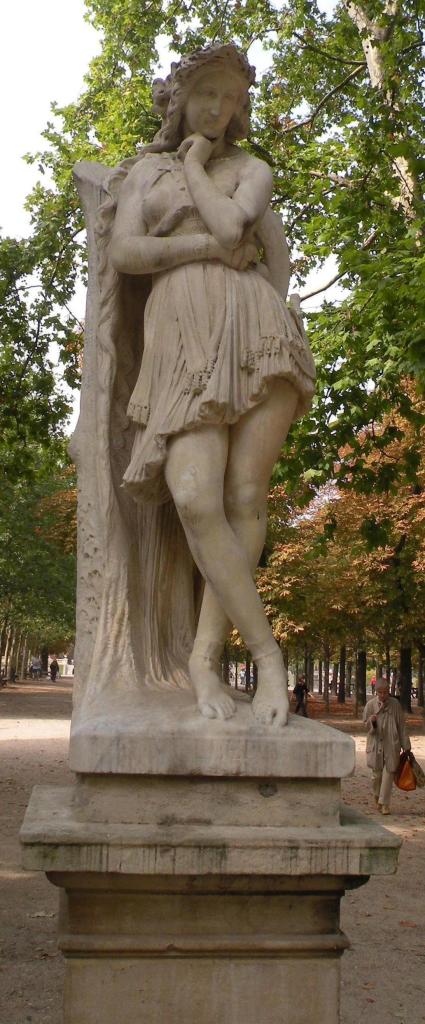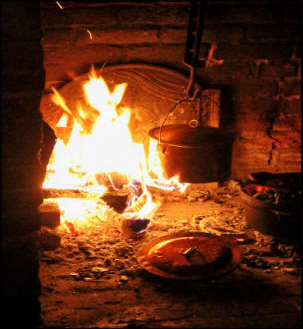
Statue of Veleda, Jardin de Luxembourg. Credit: Chatsam.
Julius Caesar wrote in Gallic War that the Germanic tribes allied under Ariovistus followed the divinations of their matrons when deciding whether or not to fight: “among the Germans it was the custom for their matrons to pronounce from lots and divination, whether it were expedient that the battle should be engaged in or not” (Gallic War 1.50).
Tacitus, writing centuries later, described the role of Germanic women in inciting bravery and the importance of prophetesses:
They also carry with them into battle certain figures and images taken from their sacred groves. And what most stimulates their courage is, that their squadrons or battalions, instead of being formed by chance or by a fortuitous gathering, are composed of families and clans. Close by them, too, are those dearest to them, so that they hear the shrieks of women, the cries of infants. They are to every man the most sacred witnesses of his bravery—they are his most generous applauders. The soldier brings his wounds to mother and wife, who shrink not from counting or even demanding them and who administer both food and encouragement to the combatants.
Tradition says that armies already wavering and giving way have been rallied by women who, with earnest entreaties and bosoms laid bare, have vividly represented the horrors of captivity, which the Germans fear with such extreme dread on behalf of their women […] They even believe that the sex has a certain sanctity and prescience, and they do not despise their counsels, or make light of their answers. In Vespasian’s days we saw Veleda, long regarded by many as a divinity. In former times, too, they venerated Aurinia, and many other women, but not with servile flatteries, or with sham deification. (Tacitus Germania 7-8)
Providing a concrete example for his generalization in Germania, Tacitus reports in Histories that the Batavian warlord Julius Civilis, who led a revolt against the Romans in 69 CE, fought a victorious battle with “his own mother and sisters, and the wives and children of all his men” encouraging him from behind:
Civilis, surrounding himself with the standards of the captured cohorts, to keep their recent honours before the eyes of his own men, and to terrify the enemy by the remembrance of defeat, now directed his own mother and sisters, and the wives and children of all his men, to stand in the rear, where they might encourage to victory, or shame defeat. The war-song of the men, and the shrill cries of the women, rose from the whole line. (Tacitus Histories 4.18)
These types of practices were found not only among the Germanic peoples, but also among the Britons. In Boudica’s revolt of 60 CE, the Britons brought their wives to the battlefield “to witness the victory:”
The army of the Britons, with its masses of infantry and cavalry, was confidently exulting, a vaster host than ever had assembled, and so fierce in spirit that they actually brought with them, to witness the victory, their wives riding in waggons, which they had placed on the extreme border of the plain. (Tacitus Annals 14.34)
Furthermore, Boudica launched her revolt in 60 CE, while the Romans were busy fighting Druids and torch-wielding women on the Isle of Mona (Anglesey):
On the shore stood the opposing army with its dense array of armed warriors, while between the ranks dashed women, in black attire like the Furies, with hair dishevelled, waving brands. All around, the Druids, lifting up their hands to heaven, and pouring forth dreadful imprecations, scared our soldiers by the unfamiliar sight, so that, as if their limbs were paralysed, they stood motionless, and exposed to wounds. (Tacitus Annals 14.30)
Prophetesses
The aforementioned Veleda prophesied the revolt of Julius Civilis, and after his initial victory, Civilis sent her a captured Roman officer as a gift:
Munius Lupercus, legate of one of the legions, was sent along with other gifts to Veleda, a maiden of the tribe of the Bructeri, who possessed extensive dominion; for by ancient usage the Germans attributed to many of their women prophetic powers and, as the superstition grew in strength, even actual divinity. The authority of Veleda was then at its height, because she had foretold the success of the Germans and the destruction of the legions. (Tacitus Histories 4.61)
Veleda is said to have “dwelt in a lofty tower, and one of her relatives chosen for the purpose conveyed, like the messenger of a divinity, the questions and the answers” (ibid 4.65). On another occasion, Germanic rebels gave her a captured praetorian trireme as a present (ibid. 5.22).
Michael Enright, in Lady with a Mead Cup, lists other prophetesses allied with warlords or warbands:
Cassius Dio mentions another warlord/prophetess pair when he says that Ganna, successor to Veleda, accompanied Masyos, king of the Semnones, to Rome […] and Suetonius says that Vitellius kept a woman of the Chatti whom he trusted as an oracle. Another piece of evidence for such pairing has been found in, of all places the island of Elephantine near the southern border of Egypt. Written on an ostrakon in second century Greek occurs the name of Baloubourg (recte Waluburg), a sibyl of the Semnones, who is unlikely to have landed in those climes unless she accompanied a band of auxiliary troops of her people. (64)
Enright’s theory that warlord-prophetesses is an ancient pairing in Germanic (and Gaulish) cultures may provide an additional layer of explanation to Spartacus’s ability to lead a combined army of Thracians, Gauls, and Germans in his revolt of 71 BCE:
It is said that when he was first brought to Rome to be sold, a serpent was seen coiled about his face as he slept, and his wife, who was of the same tribe as Spartacus, a prophetess, and subject to visitations of the Dionysiac frenzy, declared it the sign of a great and formidable power which would attend him to a fortunate issue. This woman shared in his escape and was then living with him. (Plutarch Life of Crassus 8.3)






 According to the IRPGF (International Revolutionary People’s Guerrilla Forces), an anarchist militia fighting within the Rojava revolution against Daesh/Islamic State in so-called Syria, an anarchist from the United States, Heval Demhat (nom de guerre) has been martyred during the struggle to liberate Raqqa in Syria from Daesh control.
According to the IRPGF (International Revolutionary People’s Guerrilla Forces), an anarchist militia fighting within the Rojava revolution against Daesh/Islamic State in so-called Syria, an anarchist from the United States, Heval Demhat (nom de guerre) has been martyred during the struggle to liberate Raqqa in Syria from Daesh control.

